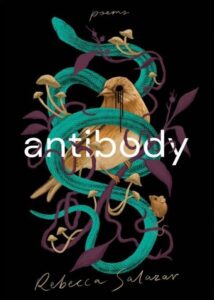 Reviewed by Namitha Rathinappillai
Reviewed by Namitha Rathinappillai
Rebecca Salazar, antibody (McClelland & Stewart, 2025), 160 pp., $22.95.
Rebecca Salazar’s sophomore poetry collection, antibody, is a telling, a retelling, and an untelling: of the graphic and the pacified; the idiosyncratic and the kindred; and the mundane and ever-potent dimensions of sexual-trauma survivorship.
This collection is visceral in both detail and in analysis: Salazar’s dedication at the beginning of the book is, itself, functionally a content warning. The author dedicates antibody to those “who are forced to be evidence”: a poignant allusion to fellow survivors. The dedication concludes, “If this is as far as you read, thank you. This book is still written for you.” As a collection about the very trauma that occurs when consent is lacking, uninformed, or entirely negated, I held its unprecedented dedication with deep gratitude. To be seen without having to confide, or confess, or offer the narrative of our worst day(s) as collateral in order to be seen as telling a convincing-enough case—this is a confirmation of kinship for those who have experienced this type of violence. This sentiment of unconditional belief in one’s experience as care is mirrored back in Salazar’s epigraph, a quote from another powerful and prolific narrative on survivorship: In the Dream House by Carmen Maria Machado: “None of these things exist. You have no reason to believe me.” And still, we do.
In “true,” Salazar opens with:
because the hell you gave me bore no name
when it was given i have learned what it is called
in true crime podcasts. plaster bust casts
of manson and bundy […]
…..and who knew healing
looked like googling crime scene photos to remake
my chalk dimensions. bust. waist. hips
Thematically similar to Olivia Gatwood’s Life of the Party, in antibody Salazar, too, speaks of the impersonal, and yet at times, legitimizing nature of the very real violence in which sensationalized true crime holds its foundation. When a trauma is so unspeakable that we do not hear about it elsewhere, we often find ourselves seeking solace in whatever places will mirror our experiences back to us—and this place is sometimes one that both heals and commodifies our pain. Salazar twice validates this experience in these lines: first, in finding this comfort in true crime; second, in that it is okay and natural to do so when we cannot find it elsewhere.
 antibody’s poems speak not only to the emotional exploration of the multitudinal nature of trauma, but ground it in the corporeal as well. In “carbon footprint of one (1) rape,” the author plays with temporality and renders us in the archive: the material components of what follows immediately after the event itself. The stylistic choice to present the tangible as a carbon footprint begins to reveal itself in the line “if a person was disposable, how many. // if a person is disposable, what else.” When we reflect upon the disdain with which we speak about the everyday use of disposable materials, particularly this use, we can reimagine the truly dehumanizing nature of treating a person with this complete and utter lack of care.
antibody’s poems speak not only to the emotional exploration of the multitudinal nature of trauma, but ground it in the corporeal as well. In “carbon footprint of one (1) rape,” the author plays with temporality and renders us in the archive: the material components of what follows immediately after the event itself. The stylistic choice to present the tangible as a carbon footprint begins to reveal itself in the line “if a person was disposable, how many. // if a person is disposable, what else.” When we reflect upon the disdain with which we speak about the everyday use of disposable materials, particularly this use, we can reimagine the truly dehumanizing nature of treating a person with this complete and utter lack of care.
On the other hand, in this same poem Salazar asks us to reflect on the comforting usage of other resources, such as water. Consider these lines:
water to wash hands.
water to wash the stained sheets.
water to wash the imprints from the body.
water to wash the imprints from the body.
The repetition in speaking of water, particularly in the last line, elicits a deep sense of understanding or familiarity for those who can empathize with the pain and those who can relate to it, respectively.
The multiplicity of self that can occur in how we care for ourselves after we experience trauma is seen in the poem “underground twin.” This duality of self is aesthetically reminiscent of Lupita Nyong’o in Us. Paired with visceral earth-based imagery, the poem culminates in this pleading to one’s self:
i am starting to unmoor again
from memory. dear doppelganger,
do not let me bury myself too,
no matter how the coolness
of dark wormy earth, is poultice.
This begging for internal strength is a profoundly vulnerable and commonplace feeling, and how Salazar names these feelings makes space for us to then feel them ourselves.
While rage need not be a prerequisite to speaking about trauma, especially that which occurs at the hands of others, reading of it feels like a balm to the part of ourselves that holds a righteous anger. In “Little Deaths,” which one can assume is a reference to the French term for an orgasm, la petite mort, we see these parallels between pleasure and suffering, especially in contexts where the pleasure of one is at the expense of another:
is fucking men at all
the darkest edge play
their conviction rate so low
that 99.5% just get off.
The double entendres that Salazar so eruditely implements in this poem amplify our view of these dimensions of sexual violence: we see in even these few lines how violent men can benefit doubly, through escaping accountability all while without having to sacrifice a morsel of pleasure.
Through these poems, we vividly experience what it is like to have your body be treated as a possession, an object, something for someone else to lay ownership to. So Salazar’s poems in which they speak about themselves and those they love with tenderness and sensuality are twice as sweet. In “the gender today is a split plum & dad bod,” the author writes:
let me feed you
this ripe question of a body. swallow with me
all the soil and shit i’ve grown through
to burst full and tart against your tongue.
This soft and powerful poem, how it flips language of consumption to be an act of care rather than disappearance enacted upon another, deepens our reading of all of these poems and the trauma they speak so potently about. We are reminded that in the end, we are never just what has happened to us without our consent: we are always what we become in spite of it.
Her words weighted with the burden of acknowledgement, Salazar speaks these often-hidden truths into a greater existence, freeing them from the power they hold over us. Though devastatingly brutal, the themes of this book and how Salazar so sagely depicts them are of value to survivors, and those who love survivors. I am grateful to have read them, and look forward to future works by Salazar.
Namitha Rathinappillai (she/they) is a genderqueer Tamil poet, organizer, and workshop facilitator. She is currently based in Toronto with their two cats, Halloumi and Paneer.







